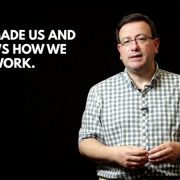Confessions of a Christian Life Hacker
Written By Karen Kwek, Singapore
A lifelong scribbler, Karen enjoys the company of friends, a great cup of tea and seeing the gospel transform hearts and lives. She worked as a book editor until she and her husband traded peace and quiet for parenthood. It seemed a good idea at the time.
I watch, impressed, as a friend tears open a bag of crisps, tucks in the bottom corners of the packet and keeps rolling the sides under until he’s created an instant snack bowl from nothing but the original packaging—ingenious! My husband, our family’s resident tech support, has not only networked all our wireless gadgets together but also united all our entertainment subscriptions under the rule of the one ring—I mean, the one remote control. Ah, life just got that much easier!
I’m a huge fan of life hacks—creative problem-solving systems and shortcuts that increase productivity. Such time-saving strategies used to be part of the practical knowledge passed down from parent to child, trainer to apprentice, in any discipline, but, as you might have guessed, we have the computer industry to thank for reinventing an old concept and making it go viral.
In 2004, tech journalist Danny O’Brien studied the work processes of highly productive computer technologists (popularly called “hackers”). He found that what they had in common were certain tricks that greatly simplified their programming tasks. The term “life hacks” was born, and expanded to describe any workaround, tip or trick that helps us get more things done faster, better and often more economically. Today, the Internet and media-sharing platforms such as YouTube have made life hacks accessible to almost anyone, anywhere.
And who doesn’t love a good life hack?
From keyboard shortcuts for our software, to clever ways to peel and slice fruit, to holidaying on a shoestring budget, here’s why I love ‘em:
- Life hacks free me up to work less . . . and live more. I spend less time slogging away at the hard stuff, so I have more time to kick back and enjoy the results.
- I feel clever when I solve a problem in a fraction of the time or cost that it normally takes, and without having to call in the specialists. In fact, almost anyone can become an “expert” just by checking out “How To” articles and videos on the Internet.
- Like everyone else, I’m hardwired for instant gratification. Human beings want things, and we want them now. Getting what we want now makes us feel good, whereas waiting is hard for us because it creates stress and worry. Advertising companies and marketers constantly exploit this fact of human psychology, for example through their taglines (“Hurry while stocks last!”) or by providing on-demand services.
These reasons strongly appeal to us because modern society is spoilt for choice by an increasing array of options, products and services. With so many things vying for our attention and money, the modern consumer is a king accustomed to the quick and easy solution. We’ve developed a “fix-it” mindset. Have you noticed, for instance, how hung up we are on seeing results—fast?
There is an “instant” version of almost everything, from coffee to messaging to credit approval. Biotechnology is figuring out faster and faster ways to grow plants and animals so we can get them onto our dinner plates sooner. Even news and advice are packaged to convey maximum information at a glance—how often have you seen titles like “5 Steps to Getting Rich” or “7 Secrets of Successful People”? Forget having to learn through hands-on experience or read a whole how-to guide or article to get the essential tips—we’ve even life-hacked life hacking.
Or have we?
Are there Christian life hacks?
It’s tempting to view not just our work tasks but all of life through “fix-it” lenses. As technology writer and creator of the term “life hacks”, Danny O’Brien, observes, “[F]or most people . . . modern life is just this incredibly complex problem amenable to no good obvious solution. But we can peck around the edges of it; we can make little shortcuts . . . So the idea of life hacks is just really appealing, because it’s an expression of this huge hope that you can actually hack life in this way, that you might make it a bit more bearable without having to swallow or understand the whole thing.”
Subconsciously, many people feel this way about life. Perhaps through our quick fixes we hope to control whatever we can, so that the whole messy business of life doesn’t unravel and overwhelm us. Don’t get me wrong—I’m all for getting things done well, and shorter queues at the bank (well, shorter queues anywhere!) But is life really just a complex problem? Are quick fixes our best bet? As I thought about my love for shortcuts and my quest for clever solutions, it occurred to me that the Bible presents a different perspective on life.
Life is not a problem; it’s a relationship
The great wise King Solomon spent his lifetime studying the world and despite his wisdom, concluded that it was unfathomable. “No one can comprehend what goes on under the sun. Despite all their efforts to search it out, no one can discover its meaning. Even if the wise claim they know, they cannot really comprehend it.” (Ecclesiastes 8:17)
Solomon understood that quick fixes weren’t the answer—he’d already tried them all! From knowledge to pleasure, from hard work to progress and wealth, nothing satisfied his quest for life’s meaning. Until he recognized that God is Maker of us all, and judge, and our lives therefore bear a connection to, a relationship with God. “Remember your Creator,” Solomon concluded, “in the days of your youth . . . Fear God and keep his commandments, for this is the whole duty of man.” (Ecclesiastes 12:1; 13)
Left to our natural selves, however, we humans cannot please God, because we ignore or disobey Him and rightly deserve His punishment. Yet the good news is that God has restored our relationship with Him through the work of Jesus Christ, who died on the cross to save us. The Christian life is this restored relationship, true and everlasting. And because it’s a relationship, there are no shortcuts.
In fact, we face difficulties for a reason— God has plans to develop our character through adversity. As the apostle Paul wrote, “we know that suffering produces perseverance; perseverance, character; and character, hope.” (Romans 5:3-4) We are told to “be still before the Lord and wait patiently for him” (Psalm 37:7), trusting him to act in his good time. But for instant gratification addicts, waiting is hard!
Indeed, being Jesus’ faithful disciple takes patience and effort on our part—no mantras; no easy workarounds.
I’ve discovered how unhelpful my “fix-it” mentality can be for my relationship with God. How often I’ve mistaken the thanks I mumble to God before meals, or my desperate ramblings before falling asleep, for a healthy, sustained prayer life and an attitude of humble dependence on Him. How often I’ve substituted the hasty reading of a random comforting verse of Scripture for an in-depth study of a Bible passage, thinking that I’ve read God’s Word all the same. How often I’ve read His Word but failed to put any of it into practice. How often I’ve come away after a church service, feeling that I’ve earned the right to do things my way because my one or two hours of “worship” are done. When I fall prey to these and other “Christian life hacks”, I ironically end up neglecting my relationship with God and failing to enjoy His presence in my life.
The Divine Life Hacker
Having observed that there are no shortcuts in the Christian life, however, I do want to leave you with this thought: if a life hack is something that saves us a lot of trouble and frustration, then surely Jesus’ rescue of us was the ultimate example! His death has taken away the sins of many, once and for all—a literal lifesaver. Furthermore, in Christ we find all the wisdom and power of God, everything we need for eternal life with Him.
This means that His Word also equips believers for life in the here and now, so we would do well to pay attention to Scripture, for it’s the Lord who gives wisdom and guards the ways of his faithful ones (Proverbs 2:6-11). He doesn’t promise easy workarounds, but his wisdom and insight can protect us from painful mistakes—“Fear God and keep his commandments, for this is the whole duty of man”.
I’m still going to visit my favorite websites for handy tips and tricks, and learn to use Google like a boss, but now that I think about it, wise ol’ King Solomon was on to probably the greatest life hack of all.










Trackbacks & Pingbacks
[…] Penulis: Karen Kwek, Singapura Artikel asli dalam Bahasa Inggris: Confessions of a Christian Life Hacker […]
Leave a Reply
Want to join the discussion?Feel free to contribute!